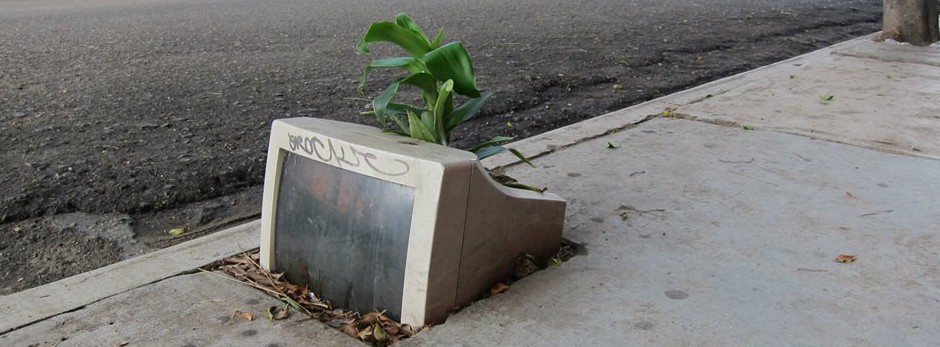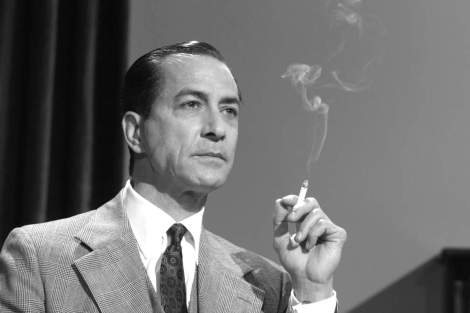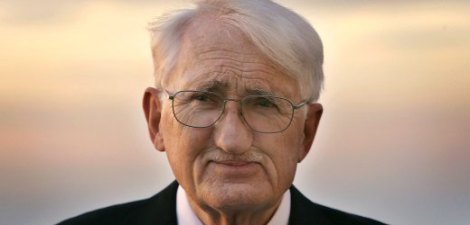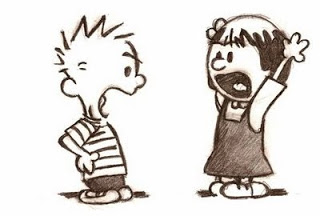“Journalism is printing what someone else does not want printed: everything else is public relations.” – George Orwell
It’s a pretty awesome statement capturing a lot of feels people have towards media and journalism today. (P.S the dude pictured above is not George Orwell – it’s David Strathairn playing Edward R. Murrow in Good Night, and Good Luck – top film)
So what’s this have to do with political economy? Well firstly, political economists look at journalism with an unnerving eye – examining it through economic and political pressures as well as thriving, capitalist power structures. Today, they also consider the role played by your average Joe. The phrase ‘citizen journalism’ gets thrown around more carelessly than Bachie’s undying love, but what exactly is it?
“When the people formally known as the audience employ the press tools in their possession to inform one another that’s citizen journalism”
Now, if you study or have studied communications you’ll be well familiar with the name I’m about to chuck into the mix. Before you scream “OMG GLOB DO NOT SAY GRUNIG!!!” Take a deep breath, relax. I wouldn’t do that to you : )
I’m talking about Jurgen Habermas, the cat who’s always banging on about the public sphere – that space for peeps to rationally debate things like politics and social issues.
He thinks that the mass media play a crucial role in contributing to liberal democracy because it disseminates information and enables people to talk about things that matter. But most liberal democracies are also capitalist societies and this has an obvious influence on media and journalism. Habermas (like me and other political economists) thinks that concentrated media ownership messes up civic participation as does the “intertwining of economic and political power” (cheers Flew & Liu).
You could say that new technology, likes blog platforms, gave life to citizen journalism which was ultimately driven by the public’s frustration with mainstream media and dodgy ethics. Creating our own content using new media is an attempt to smash the power structures.
But does citizen journalism really shift the balance of power?
In my next post I’ll be exploring some examples but I’d love to know your initial thoughts. Let the discussion begin!!




Hi Emmica. First of all, I think your sense of writing is awesome 🙂
To answer your stated question in the post, I do not believe citizen journalism shift the balance of power within the practice, as mass media generate the attention. I hope others have a different perspective on this case, to generate a fluent discussion.
LikeLiked by 1 person
Thanks Joe, I tend to agree. I haven’t really found too many examples of where people have relied purely on citizen journalists for info. Some would say though that citizen journalists put pressure on the media to cover certain stories, ask further questions etc. Be interesting to see what others think : )
LikeLike
Hi Emmica.
To join in on the discussion, I tend to think that a total shift of power entails massive pressure and force. Therefore I don’t think that citizen journalism can shift the balance of power within the practice all by itself. Though I must agree with your statement about citizen journalists putting pressure on the media. Hereby this particular kind of journalism shows its value by being critical and provocative, and giving a voice to marginalised groups in the society. Often the media tends to act as a dominant coalition instead of being advocates. To me, it is important to keep on challenging this power relationship and this, I believe, is what citizen journalism actually does.
LikeLike
Cheers for the comment! Yeah I agree that citizen journalism is a chalk which force but I’m also with you in thinking that it won’t create a shift of power by itself. I tend to think that teaching media literacy as early as primary school would be a good way to extend this challenge and empower citizens : )
LikeLike
Really enjoyed your piece – quirky and informative!
I’m sure you’ll cover more interesting examples in your next post, but one site that comes to mind is Grantland. It’s a sports and popular culture website that started off as a counterpoint of alternate sports/pop culture news against the big boys and has grown to the extent that it’s now “unofficially” affiliated with ESPN.
Reading between the lines, I guess the example is a form of “‘re-colonisation” in which a form of citizen journalism can provide interesting counterpoints, thrive, be commercially successful even, but in reality they are also up for sale.
It’s why things that are so cool at the start because they’re quirky, and not many people know about it, invariably get noticed, picked up by the masses,become mainstream, and aren’t cool anymore 🙂
Great read!
LikeLike
Cheers for the comment!
Yeah it’s kinda like the cliche of underground bands going mainstream and becoming commercialised – but hey you gotta make a living right?!
I think what you’ve raised about Grantland is interesting and I can see a trend of citizen journalists working with or become intertwined with mainstream media. I can’t seem them standing alone without an influence or input by the veterans.
Time will tell hey : )
LikeLike
Hi Emmica – thanks for the piece. An entertaining read and you bring up some interesting points. Personally, I think that citizen journalism does bring a shift in power in the sense that people are looking to other forms of media for their information. There were stats in our 3rd lecture which stated that two-thirds of Australians didn’t believe newspapers to be ‘fair or accurate’ so it makes me wonder if they’re looking to other sources like citizen journalists. Even the media now such as the ABC invite viewers to send in their pics or stories around events (think natural disasters like cyclones) – in a sense they are encouraging citizen journalists. Perhaps it’s their way of trying to work with citizen journalists rather than compete with them?
LikeLike
Hey Nadine, thanks for the comment : )
I think you raise an important point about the nature of citizen journalism as potentially diverse as content represents the opinions or experiences of many different peoples rather than a publication that is influenced by marketing, management, advertisers etc.
I do think that the point Sue raises too is important though – can citizen journalists be trusted? Interesting what you mention about the ABC – I’ll be sharing some similar examples and I can definitely appreciate the role people may play now in contributing to media.
LikeLike
It seems to me that power structures are most likely to be brought asunder by revolution and perhaps “citizen journalism” can contribute to that but I remain sceptical about all that power to the people stuff – despite my hippy leanings … New technologies certainly make it easier for citizen journalists to make their points of view known to a wide audience but why suppose that they are any more trustworthy/accurate than mainstream media?
LikeLike
Hey Sue, appreciate your comment : )
Yep I’m definitely sceptical but I guess I can’t ignore the potential role that citizen journalism may play in reshaping media and power structures. Although that’s a very significant point about whether citizen journalists are trustworthy. With my critical thinking hat on I’d say that we probably consume all media with a certain level of distrust, using our own knowledge, common sense, conceptual thinking and research to comprehend the truth : )
LikeLike